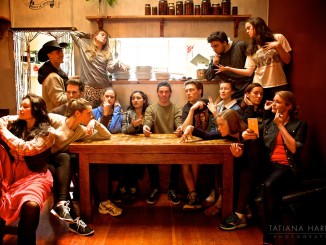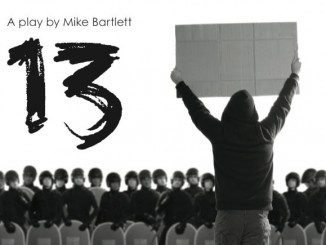
‘Actors have it easy..?’
As the world waits with bated breath for the 2020 US election results, the Actors’ Program premieres Fake News at the Basement. Politically speaking, it is a long, arduous day in which Donald Trump – who uses the phrase ‘fake news’ with alarming regularity – declares he is President before votes have been counted. The night is auspicious, and the Actors Program have something to say.
The black box studio fills, as audience members take their seats on two sides of a central stage space. A gift greets us – a small, brown paper bag. The contents will be revealed in the final scene of the production some hour and forty minutes later.
Fifteen graduates take the stage, assembling in opposing tableaus. There is uniformity in their simple attire – jeans and white T-shirts – but each cast member demonstrates individuality through their own declaration of ‘fake news,’ which includes a Netflix casting and a desire to be somewhere else. Animated performances remind us of the purpose of the production: for graduates to stand out and be noticed.
The action continues and an ensemble scene, directed to the audience, proposes a drinking game: we are told to drink when confused; when feeling uncomfortable; when feeling uncomfortable because of the person sitting beside us. At this point, thankfully, no one coughs into their sleeve.
We are led on a journey through approximately two-dozen vignettes, taken from Kiwi writers and international plays of note: Spring Awakening (Franz Wedekind), A Bright Room Called Day (Tony Kushner), and Mr Burns (Anne Washburn) to name a few. Selections explore the subjects of memory and of crafting our own narrative – ‘fake news’ is delivered in bite-sized chunks, allowing each performer the chance to have their moment.
Wooden frames successfully mark rooms – an interrogation cell, a podcasting booth, a hospital ward – and clip on props help to create seamless transitions. The use of costumes transports us to different time periods and countries, and a smattering of accents add variety. Olivia Reynold’s spin as a fast-talking Brooklynite holds the limelight, eliciting laughs in what turns out to be a drama-heavy production.
Dylan Thuraisingham and Mana Tafatu add to the lighter mood, especially within their extracts from Aroha Silenzio’s 2080. Set in a divided New Zealand of the not-so-distant future, they meet nurse Nancy, played by Te Arohanui Way-Korewha. The narrative is revisited through three scenes, and the threesome provide what feels like the most compelling backbone of the production. Te Arohanui’s understated charisma shines throughout.
The audience is dimly lit, and reactions from members of the opposite side are easy to make out, but at times the staging challenges performers. In comparison to scenes with more than one character, individual monologues sometimes fail to captivate.
More skilled actors managed to play to both sides of the audience, setting themselves head and shoulders above the rest. Gabriela Chauca’s stream of consciousness, taken from Uther Dean’s Massive Crushes, is remarkable in its penetrating ugliness as she depicts a woman on a date with a despicable man.
Interrogated as part of Ben Henson’s Headsand, Pamela Sidhu’s emotional range is striking. Scarlett Wynter’s Wendla in Spring Awakening is stomach-churning as she convincingly depicts the naive and pregnant fourteen-year-old.
In the final scene we are asked to take an eye-mask out of our brown paper bag and, eyes covered, we are led through a guided meditation to meet our ancestors… thousands of them.
The lasting impression is that we are all connected – but the same can’t be said for the disparate narratives within Fake News. If we are to believe the aforementioned drinking game rules, that’s the whole point of this year’s grad show.
Director Stella Reid and Michele Hine (Artistic Manager) both acknowledge through the show notes how deeply the TAP show has been affected by world events since January – with the final performance oscillating between alert levels and forms. It would be interesting to see how much the production has changed, and what aims have been retained.
Every graduating class from The Actors’ Program faces uncertainty as they enter the throng of professional actors and jostle for space, but it’s safe to say no other cohort has had it as tough as the 2020 group. This year the arts sector has had to pause, adapt, and stumble into the light – to try and create something beautiful. Fake News is no exception.
It’s a messy, topsy-turvy forray into the life of an actor – whose professional purpose is to deliver narratives, or ‘fake news,’ with compelling believability. The vast majority of the TAP graduates succeed in this, and are a delight to watch.
Fake News plays Basement Theatre 4 to 14 November, 2020.




Leave a Reply